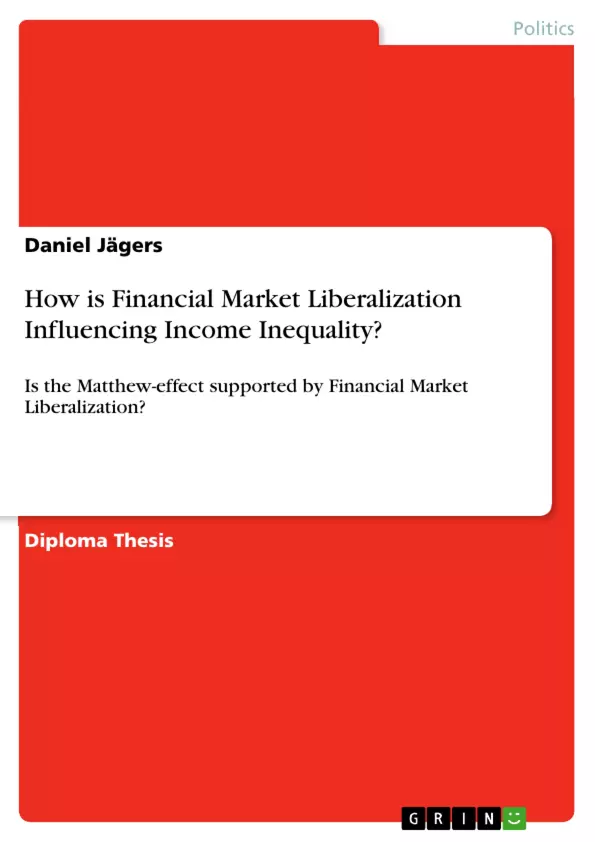Observing an increasing financial liberalization and income inequality during the last decades, this study investigates how the opening of financial markets is influencing income inequality. Operationalizing the research question, it focuses on capital account liberalization (CAL).
The paper begins with an extensive literature review which recognizes the importance of a countries institutional quality and derives the following two hypotheses: CAL generally increases income inequality and CAL leads to an especially high increase in income inequality if the institutional quality is low. These hypotheses are empirically tested based on a panel data set covering 159 countries from 1996 – 2009.
In the last decades the economies and financial systems of many countries liberalized and integrated with each other in order to benefit economically. However, at the same time income inequality and the gap between the extreme poor and the rich increased. The European Union is one of the regions with the most remarkable development regarding financial liberalization and integration. Some countries have been transformed within the last 25 years from centrally planned economies with controlled financial markets to market economies with open financial markets, integrated within the European Monetary Union.
On the one hand this financial liberalization and integration is argued to be an important reason for economic growth. However, on the other hand it is strongly related to the Euro currency crises which is currently the main challenge facing the EU and is discussed daily on the news. The lower- and middle-classes in particular are protesting against immense financial supports for banks and investors on the one side and wage reductions, unemployment and social benefit cuts on the other. Can these inequalities be explained by the increasing liberalization of financial markets?
Are they logical consequences of international financial liberalization and integration? This paper approaches these questions on a meta-level by answering the research question: How is Financial Market Liberalization Influencing Income Inequality? Before elaborating on this research question and explaining the investigated hypotheses it is explained what exactly is meant by financial market liberalization.
Inhaltsverzeichnis (Table of Contents)
- Introduction
- What are Liberalized Financial Markets?
- Hypotheses and Structure of the Paper
- Literature Review and Hypotheses
- Reasons for Financial Market Liberalization and Integration
- Capital Account Liberalization and Economic Growth
- Capital Account Liberalization and Economic Stability
- Capital Account Liberalization and Poverty / Income Inequality
- Quantitative Research
- Model Design
- Data
- Response Variable: Income Inequality
- Explanatory Variable: Capital Account Openness
- Explanatory Variable: Institutional Quality
- Explanatory Variable: Economic Development
- Logarithms, Polynomials, Lags, Binaries and Interaction Variables
- Regressions and Causality
- Interpretation of Basic Regressions
- Crises, CAL and Income Inequality
- Endogeneity and Instruments
- Endogeneity Calculations
- Quantitative Answers for Hypotheses
- Open Capital Accounts generally Increase Inequality
- Capital Account Liberalization leads to an especially high increase in income inequality if the institutional quality is low
- Sensitivity Analysis
- Adjustment for Outliers
- Alternative Proxies
- Discussion of the Results
- Summary of Results
- Limitations and Further Research
- Implications
Zielsetzung und Themenschwerpunkte (Objectives and Key Themes)
This study examines the relationship between financial market liberalization and income inequality. It focuses specifically on capital account liberalization (CAL) and investigates its impact on income inequality across various countries. The study aims to determine whether CAL generally increases income inequality and if this impact is particularly pronounced in countries with low institutional quality.
- Financial market liberalization and its impact on income inequality
- The role of capital account liberalization (CAL) in shaping income inequality
- The influence of institutional quality on the relationship between CAL and income inequality
- Empirical analysis of income inequality in various world regions
- Policy implications for mitigating the inequality effects of financial market liberalization
Zusammenfassung der Kapitel (Chapter Summaries)
- Introduction: This chapter introduces the research question, exploring the relationship between financial market liberalization and increasing income inequality. It defines financial market liberalization and outlines the study's hypotheses and structure.
- Literature Review and Hypotheses: This chapter reviews existing literature on financial market liberalization, highlighting its potential effects on economic growth, stability, and income inequality. It then derives the two main hypotheses investigated in the study.
- Quantitative Research: This chapter details the methodology used for the empirical analysis. It outlines the model design, data selection (including income inequality, CAL, institutional quality, and economic development), and regression techniques used to assess the relationship between CAL and income inequality.
Schlüsselwörter (Keywords)
This study delves into the complex relationship between financial market liberalization, capital account liberalization (CAL), and income inequality. It explores the influence of institutional quality on this relationship, utilizing empirical data from various world regions. Key terms include financial liberalization, capital account liberalization, income inequality, institutional quality, economic growth, economic stability, poverty, and policy implications.
Frequently Asked Questions
How does financial liberalization affect income inequality?
The study investigates capital account liberalization (CAL) and finds that it generally tends to increase income inequality across countries.
What is the role of "Institutional Quality" in this relationship?
CAL leads to an especially high increase in income inequality in countries where the institutional quality is low.
What is Capital Account Liberalization (CAL)?
CAL refers to the opening of a country's financial markets to international capital flows, allowing for easier investment across borders.
Is there a link between financial liberalization and economic growth?
While argued to be a driver for growth, it is also linked to economic instability and crises, which can negatively impact lower- and middle-class populations.
Which time period does the empirical data cover?
The study uses a panel data set covering 159 countries from the years 1996 to 2009.
What are the policy implications of these findings?
Policymakers should consider that opening financial markets may require strong institutions to prevent a widening gap between the rich and the poor.
- Quote paper
- Daniel Jägers (Author), 2012, How is Financial Market Liberalization Influencing Income Inequality?, Munich, GRIN Verlag, https://www.grin.com/document/1305803



